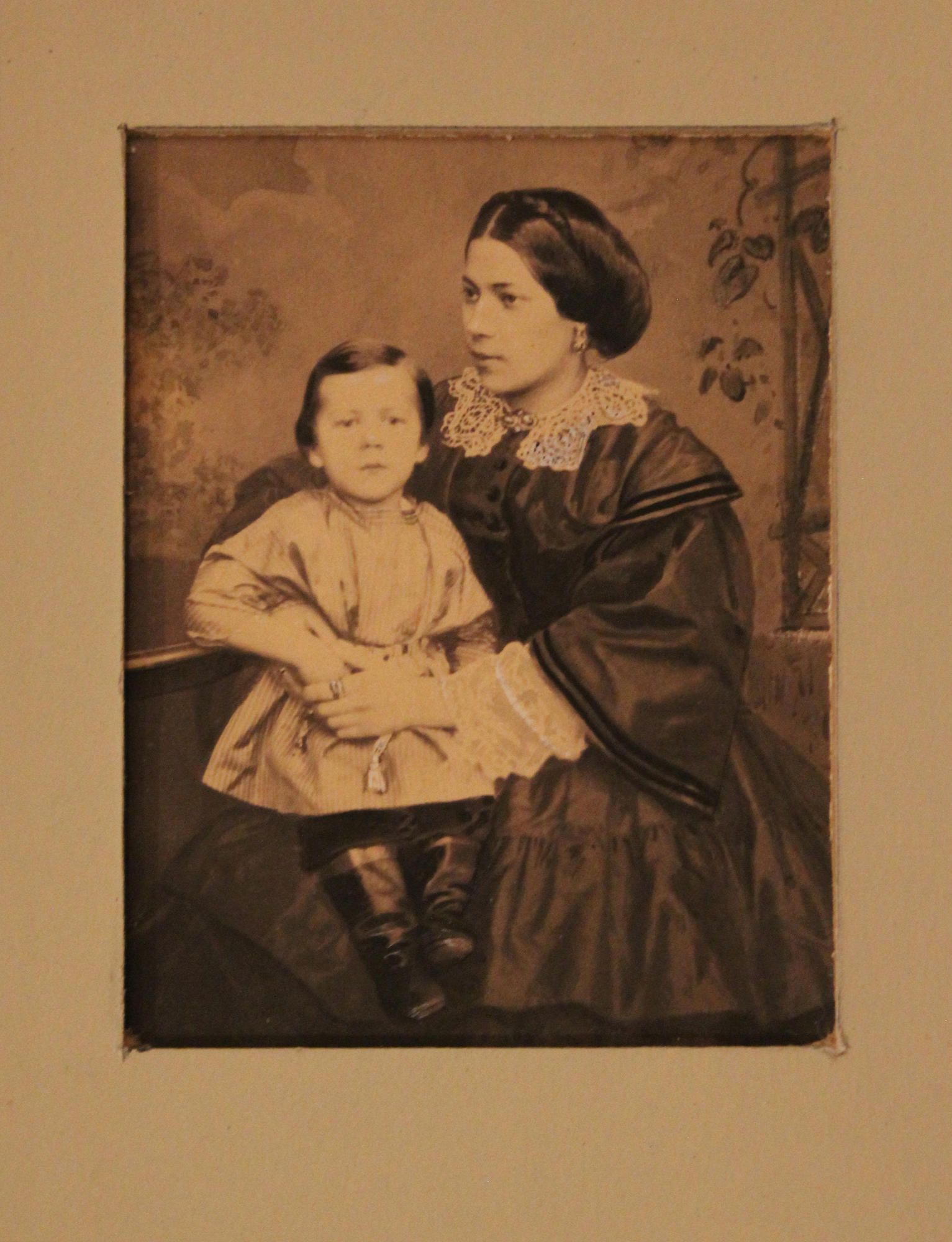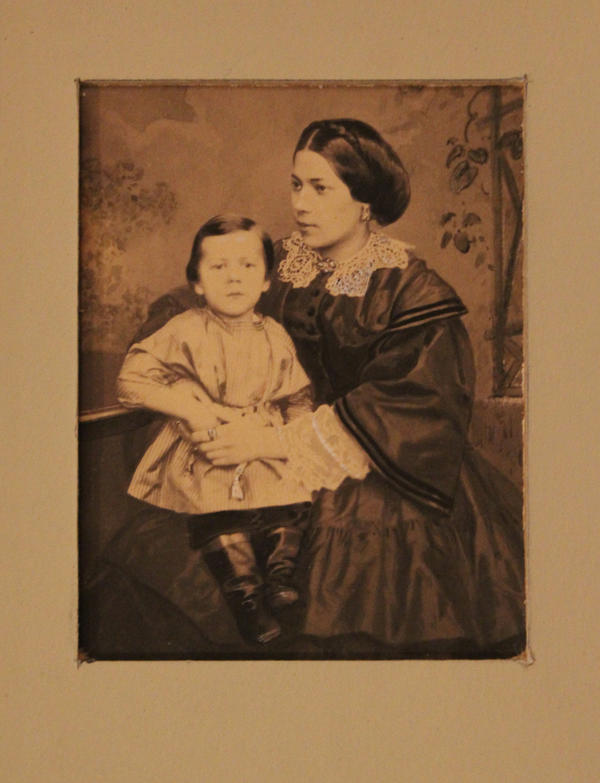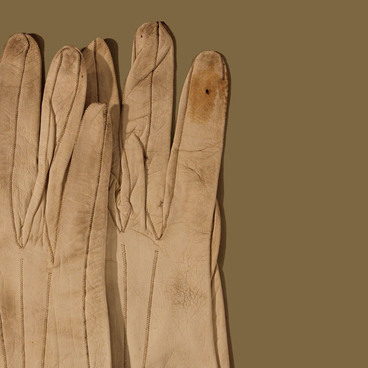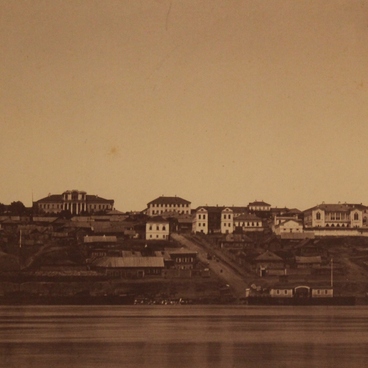The photograph displayed in the section Peter and Paul Fortress of the exposition features Olga Sokratovna Chernyshevskaya and her eldest son Alexander. The photograph was apparently taken in 1857 or 1858, with Olga Chernyshevskaya approximately 25 years of age and Alexander, about three.
In those years, the house of the Chernyshevskys was frequented by people in all walks of life – largely, well-educated folk of the third estate: the so called intelligentsia. Young students liked to visit their family very much. The heart and soul of these gatherings was Olga Chernyshevskaya, initiator of parties, fancy-dress evenings, jolly country outings and theatre visits. She was an amateur musician, artist and actress herself. When the family lived in St. Petersburg, Olga was frequently seen at art exhibitions and at the Italian opera. She went to hear Johann Strauss play and conduct his orchestra when he gave concerts in Russia.
Olga Chernyshevskaya was a great enthusiast of Russian literature, reading a lot and copying out poems by Russian authors. Her favorite poet, from the 1850s onwards, was Nikolay Nekrasov; she knew his poetry by heart. Nekrasov, on his part, dedicated one of his best long poems, Peasant Children, to Olga Chernyshevskaya: the first edition of the piece bore the printed dedication ‘To O.S. Ch-sky’, which was not, however, repeated in the reprints. Olga also shared her husband’s predilection for the lyrics of Aleksey Koltsov. Chernyshevsky gave Olga a book of Koltsov’s verse soon after they met in Saratov.
Olga Chernyshevskaya first heard about her husband’s arrest in Saratov where she and the children had moved in the summer of 1862 at his behest. “She had not stayed there more than two or three weeks when Sergei Pypin, Chernyshevsky”s cousin, informed her of the news… What a commotion it was in the house, like when there is a fire! No-one could take any food or drink.” Pulling herself together, Olga Chernyshevskaya hurried to St. Petersburg. The couple only met for the first time after the arrest on February 23, 1863.
The one trait of character that Nikolay Chernyshevsky cherished in his wife Olga was her uncompromising candour. “A more candid person than yourself, my Dearest Joy, I never have met in my life”, he wrote to her from his exile in 1878.
In 1920, the photograph was donated to the museum by Mikhail Chernyshevsky. The back of the card is inscribed in his hand with “Don”t photograph this one”.
In those years, the house of the Chernyshevskys was frequented by people in all walks of life – largely, well-educated folk of the third estate: the so called intelligentsia. Young students liked to visit their family very much. The heart and soul of these gatherings was Olga Chernyshevskaya, initiator of parties, fancy-dress evenings, jolly country outings and theatre visits. She was an amateur musician, artist and actress herself. When the family lived in St. Petersburg, Olga was frequently seen at art exhibitions and at the Italian opera. She went to hear Johann Strauss play and conduct his orchestra when he gave concerts in Russia.
Olga Chernyshevskaya was a great enthusiast of Russian literature, reading a lot and copying out poems by Russian authors. Her favorite poet, from the 1850s onwards, was Nikolay Nekrasov; she knew his poetry by heart. Nekrasov, on his part, dedicated one of his best long poems, Peasant Children, to Olga Chernyshevskaya: the first edition of the piece bore the printed dedication ‘To O.S. Ch-sky’, which was not, however, repeated in the reprints. Olga also shared her husband’s predilection for the lyrics of Aleksey Koltsov. Chernyshevsky gave Olga a book of Koltsov’s verse soon after they met in Saratov.
Olga Chernyshevskaya first heard about her husband’s arrest in Saratov where she and the children had moved in the summer of 1862 at his behest. “She had not stayed there more than two or three weeks when Sergei Pypin, Chernyshevsky”s cousin, informed her of the news… What a commotion it was in the house, like when there is a fire! No-one could take any food or drink.” Pulling herself together, Olga Chernyshevskaya hurried to St. Petersburg. The couple only met for the first time after the arrest on February 23, 1863.
The one trait of character that Nikolay Chernyshevsky cherished in his wife Olga was her uncompromising candour. “A more candid person than yourself, my Dearest Joy, I never have met in my life”, he wrote to her from his exile in 1878.
In 1920, the photograph was donated to the museum by Mikhail Chernyshevsky. The back of the card is inscribed in his hand with “Don”t photograph this one”.



